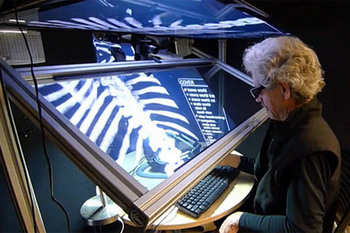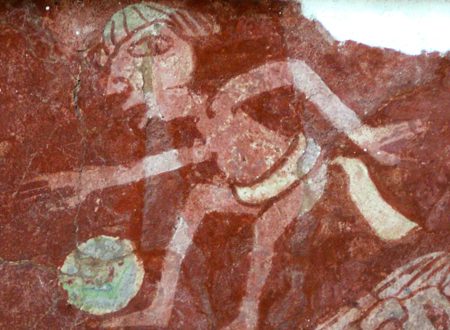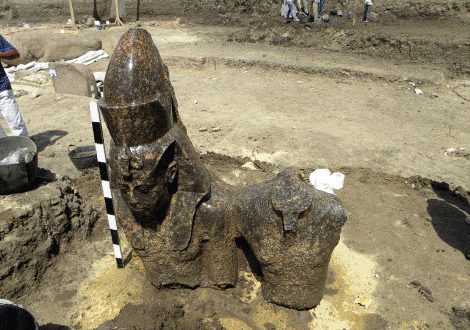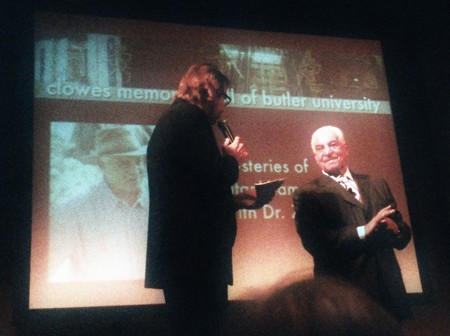 The treasures of King Tut are currently making their rounds of the US and Canada in one of the most eagerly-anticipated tours in recent years. In an exclusive interview for Heritage Key, I caught up with Dr Zahi Hawass, Secretary General of the Supreme Council of Antiquities in Egypt, after his lecture in Indianapolis on Friday, where the exhibition Tutankhamum: The Golden King and the Great Pharoahs is currently running. We got some very special insights into current issues in Egyptology, including the newly opened tomb of Horemheb, the legacy of King Tut, and Dr Hawass’s own plans for book releases and retirement.
The treasures of King Tut are currently making their rounds of the US and Canada in one of the most eagerly-anticipated tours in recent years. In an exclusive interview for Heritage Key, I caught up with Dr Zahi Hawass, Secretary General of the Supreme Council of Antiquities in Egypt, after his lecture in Indianapolis on Friday, where the exhibition Tutankhamum: The Golden King and the Great Pharoahs is currently running. We got some very special insights into current issues in Egyptology, including the newly opened tomb of Horemheb, the legacy of King Tut, and Dr Hawass’s own plans for book releases and retirement.
HK: Dr. Hawass, is it true that you plan to retire from the SCA next year?
ZH:Yes, by law I have to retire.
HK: What are your plans after leaving office?
ZH: I will continue my excavations in the Valley of the Kings, writing books, give lectures everywhere.
HK: Do you have any forthcoming books?
ZH: I have many. I have a guidebook called The Secrets of Egypt with Zahi Hawass, I have in November a book about the Valley of the Nobles called The Lost Tombs of Thebes. And I have two books coming about the guide to the Cairo Museum, and there is a big book, a big coffee table book coming in December. And there is a book coming about Cleopatra and Mark Anthony, and there are two books coming about the pyramid. This year there are about ten books coming.
HK: What will be next for the Supreme Council of Antiquities?
ZH: There’s a lot. We are revealing the secret doors in the pyramid, and we are opening the Islamic Museum, we are opening the El-Arish Museum, we are opening the Rashid Museum, we are starting excavation in winter in the Valley of the Kings, and working in the tomb of Seti I, and we are revealing many things.
HK: Everyone was very excited when KV57, the tomb of Horemheb, opened to the public.Are there any other special sites that will be opening up soon?
ZH: Yes, we are going to open Abusir to the public, we are opening Dashur, the Bent Pyramid, to the public next month, we are opening the tombs of Dynasty Eighteen in Saqqara, south Saqqara, to the public, and many museums.
HK: Is it true that the team from Leeds University began the robotic exploration of the shafts in the Queen’s Chamber of the Great Pyramid last week?
ZH: Yes
HK: Do you intend to focus just on the southern shaft or will you be returning to the northern shaft as well?
ZH: We’ll do the south and the north shafts.
HK: Is the expedition going to be televised?
ZH: No, no. We’ll record it. If there is something exciting we will make it live.
HK: Do you have any comments about Bob Brier’s theory regarding an internal ramp being used in the construction of the Great ? (as per “Archaeology,” Volume 62 Number 4, July/August 2009)
ZH: It is not a theory. It’s a theory of a French guy, his name is Houdin, and the theory is completely wrong. We did investigate the theory and we, I wrote about it everywhere. The theory is the theory of other theorists. This Houdin wants to make his theory famous and that’s why he took Bob Brier to be with him as a co-author but really Bob Brier doesn’t know anything about pyramid. He’s a good guy, he knows about mummies, but pyramids are not his field.
HK: Back in June there was supposed to be further exploration of the tunnel leading out of the third level of the Osiris shaft, under Khafre’s causeway. So has the Japanese robot already done its part there? What comes next?
ZH: We did go over one hundred and fifty now into the shaft but we did not go to the end of it, we need maybe a snake robot because of the mud, the problem of the mud.
HK: While on the subject of tunnels, everybody has been holding their breath for any news related to the tomb of Seti I. Any new adventures there?
ZH: Yes we are working now. We did reach until four hundred and forty seven feet. We did not come to the end of the tunnel yet, and we, you heard in my lecture, we found many objects inside, we found steps with graffiti, we found… I mean we did not come to the end of it. But we were told until now over two hundred and ninety feet of restoration inside of the tunnel.
HK: A little bit on museums.I know that the leadership of the Indianapolis Children’s Museum has been very active with the Suzanne Mubarak Children’s Museum. How is work progressing there?
ZH: Work is fantastic; the museum will be finished in March. The construction is finished and we are working on the making the implementation of the design.
HK: Are there any recent developments with the Grand Egyptian Museum that you might like to share?
ZH: Yes, we finished the conservation labs, and we bought all the equipment for the labs, and we did advertise the job to hire the director of the labs, of the conservation labs. And the competition for the construction will start soon.
HK: Do you have any news on the National Museum of Egyptian Civilization, particularly with regard to the royal mummies?
ZH: It’s almost finished. Yes, we are its one year and a half and then this museum will be open to the public.
HK: What about the royal mummies, where are they going?
ZH: The royal mummies there will be twenty kings, will be moved to the Civilization Museum.
HK: So what do you think is going to be next in the forensic study of mummies?
ZH: Yes, we are working now with the DNA of the family of Tutankhamun, and we hope to reveal the discoveries about this family in one month and a half from now.
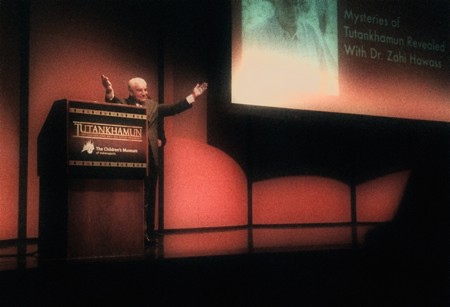 HK: The focus seems to be on identifying Nefertiti, is that correct?
HK: The focus seems to be on identifying Nefertiti, is that correct?
ZH: Oh, the mother of King Tut, the mummy of Queen Tiye, and many interesting things, who is the father, you know, things like that.
HK: How is the redevelopment of the Egyptian Museum in Cairo coming along?
ZH: The Cairo Museum? We are in one month now we… the entrance and the exit will be only an entrance, and the people will exit in the west side in a big book store and a nice cafeteria and a restaurant, and the basement has been renovated and changed, and after the objects will be moved we will have an air conditioner and will focus on the objects about master pieces, Egyptian art, showing it within the archaeological context of it. And the museum is painted, it’s going to be lighted, and in two months this will be a unique museum.
HK: Is there any middle ground possible with regard to the ban on personal photography within Egyptian museums?
ZH: There is no museum in the world that let anyone to take photographs. We made rules like every museum in the world.
HK: On perhaps a heavier note, I understand that there is evidence that Ludwig Borchardt used unethical tactics to secure the bust of Nefertiti for the Germans. Would you want to comment on what that evidence might be?
ZH: We are collecting this evidence now. I will reveal it in October when I write the letter to the Berlin Museum for the return of the piece because it left Egypt illegally.
HK: In a similar story, sometime around or after 1985 a number of precious artefacts were stolen from a warehouse in Saqqara. One of these was the mask of Ka-Nefer-Nefer, which was purchased by the St. Louis art museum in 1998. Have you made any progress in returning the mask to its rightful home?
ZH: we are still fighting, and we hope that this director [Brent] Benjamin will be honest to know that this mask is stolen. It should come back to Egypt.
King Tut captured the heart of everyone all over the world, and he comes back to do the same
HK: So with the situation of trying to return these two beautiful ladies, the bust of Nefertiti and the mask of Ka-Nefer-Nefer, to Egypt, do you sometimes see yourself in the role of rescuing the damsels in distress and bringing safely home?
ZH: Yes! This is what’s happening now. I returned over six thousand pieces to Egypt for the last seven years.
HK: With regard to Egyptology and archaeology, where should students be focusing their studies these days?
ZH: They should really study archaeology, and there are many jobs now and much interest now everywhere, and people, you know, they study, they study even language or archaeology and they do this at many universities here in the states.
HK: It seems that forensic studies are becoming more and more important in terms of using CT scans and DNA studies.
ZH: Yes, but you have people who do that. You don’t need Egyptologists to do that, you need to hire people who know about the CT scan and the DNA and you do this as a team with Egyptologists.
HK: What advice would you give to a student who wants to work on a good project?
ZH: He should write to any director of any expedition. To send his CV and to try. And I think he will, if he’s good, he will find someone to work with in Egypt.
HK: Back in June, when you attended the opening of the Tutankhamun exhibition at the de Young Museum in San Francisco, you said in a speech that there are two important ambassadors that will help relations between Egypt and the U.S.: King Tut and President Barack Obama. In what ways has King Tut already changed the world?
ZH: Look at every city, what’s happening now since thirty years King Tut captured the heart of everyone all over the world, and he comes back to do the same. I think that can show how he can be a good ambassador for modern Egyptians.
HK: In closing, I would like to ask about the role of another ambassador: Zahi Hawass. How does the promotion of Egypt and her glorious history contribute to cross-cultural dialogue, and what role does that play in world peace?
ZH: You know, I think for us to be understanding each other and know about our culture together, I think it can help in making peace for the two sides, Americans and Egyptians, and the Israelis and the Palestinians, and we hope that under President Obama that this peace can happen, to make the world happier, and not fight anymore, and no terrorists anymore.All images by Anne Houston Payne.

